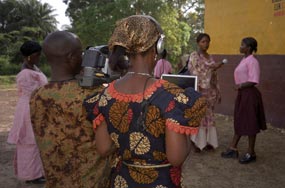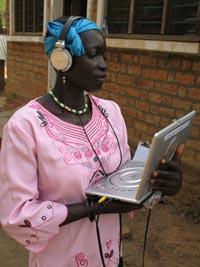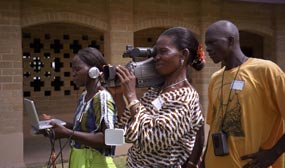Through Our Eyes
Addressing gender-based violence through community video
Read or download Community Video for Social Change: A Toolkit; watch a short video about the “Through Our Eyes” project and read related articles in the "Utne Reader" and “Forced Migration Review".
 Gender-based
violence affects millions of women and girls whose lives have been uprooted by conflict and
displacement. Rape is used as a weapon of war; women and girls seeking refuge are often coerced into sex
in exchange for food or safe passage. The effects of poverty, stress, and the breakdown of social
networks can also contribute to domestic violence and other forms of abuse.
Gender-based
violence affects millions of women and girls whose lives have been uprooted by conflict and
displacement. Rape is used as a weapon of war; women and girls seeking refuge are often coerced into sex
in exchange for food or safe passage. The effects of poverty, stress, and the breakdown of social
networks can also contribute to domestic violence and other forms of abuse.
Under the “Through Our Eyes” project, members of conflict-affected communities use participatory video to combat gender-based violence and address related issues, including HIV/AIDS, harmful practices, and women and girls’ welfare. Undertaken as a partnership between the American Refugee Committee (ARC) and C4C, the project was initiated in Guinea and Liberia in early 2006. Since then, “Through Our Eyes” teams have also been established in southern Sudan, Rwanda, northern Uganda, and Thailand. Trained in participatory approaches, these teams collaborate with community members to create dramas and documentaries that communicate critical information and present positive models of change.
 Because media
channels are often scarce in humanitarian settings, locally-made video can be especially compelling for
community members. “Through Our Eyes” teams in Liberia, southern Sudan, and Rwanda have found that
audiences become immediately and deeply involved in stories that reflect their daily reality. This
engagement helps spark dialogue and exchange on issues that are rarely addressed in other contexts.
Further, the medium of video is accessible to everyone, regardless of educational level—a vital
consideration in areas where illiteracy rates are high.
Because media
channels are often scarce in humanitarian settings, locally-made video can be especially compelling for
community members. “Through Our Eyes” teams in Liberia, southern Sudan, and Rwanda have found that
audiences become immediately and deeply involved in stories that reflect their daily reality. This
engagement helps spark dialogue and exchange on issues that are rarely addressed in other contexts.
Further, the medium of video is accessible to everyone, regardless of educational level—a vital
consideration in areas where illiteracy rates are high.
A corollary aim of “Through Our Eyes” is to build participatory communication skills at regional as well as local levels, and to promote the sharing of these skills across national borders. To this end, the project has enabled an exchange of videos across sites, country-to-country technical support calls, and numerous cross-training visits: Liberian team members co-facilitated trainings in Rwanda and Sudan; Sudanese team members co-facilitated training in Uganda; and a Ugandan team member co-facilitated the first project workshop in Thailand. It is hoped that this cross-national sharing of experience will help foster a network of community video activists in conflict-affected areas.
 Additionally,
in July 2010 participants from the five project sites gathered for a week-long Global Workshop in
Tanzania. During this event, participants shared experiences and achievements, identified key lessons,
discussed common challenges, and exchanged methods for addressing them.
Additionally,
in July 2010 participants from the five project sites gathered for a week-long Global Workshop in
Tanzania. During this event, participants shared experiences and achievements, identified key lessons,
discussed common challenges, and exchanged methods for addressing them.
In late 2010, evaluation activities were carried out in focal communities within all five sites. A variety of assessment methods were used, including in-depth interviews, focus-group discussions, and household surveys. Findings indicated that project activities had contributed to changes not only in awareness and attitudes, but also in behavior related to gender-based violence prevention and related issues. Overall, respondents felt that the participatory processes that shaped the project were central to its credibility. (For additional information on project evaluation and findings, see p. 87 of Community Video for Social Change: A Toolkit.)
C4C served as partner and technical advisor on the "Through Our Eyes" project from its inception in 2005 through April 2011. Central funding for multi-country implementation ended in 2011; project activities remain ongoing in South Sudan, Rwanda, and Thailand.
“Through Our Eyes” activities in Liberia, Rwanda, Uganda, Thailand, and southern Sudan were supported by the Women in Development Office of the United States Agency for International Development (USAID/WID). Other funders of project-related activities have included the Bureau of Population, Refugees, and Migration (BPRM), the President’s Emergency Plan for AIDS Relief (PEPFAR), and Art Action (formerly Art Venture).
For more information on the "Through Our Eyes" project, please contact:
Lauren Goodsmith
Communication for Change
Email: lauren.goodsmith@gmail.com
Tel: (410) 235-2465
or
Angela Acosta
American Refugee Committee (ARC)
Email: angelaa@archq.org
Tel: (202) 223-9074
© Communication for Change, Inc. 2003-2019. All rights reserved.
